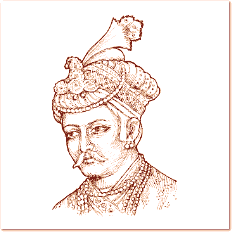
Akbar The Greatest Moghul Emperor
View: Stories about Akbar
Akbar came to the throne at a young age of 13 in 1556, following the sudden death of his father Humayun. In the early part of his rule Akbar had to fight many opponents who opposed his rule. However under the guidance of Bairam Khan, Akbar began seizing more territory throughout Hindustan. By the time of his death (1605) Akbar controlled most of northern India and Afghanistan his Empire was greater than that under Babar.
However Akbar wasn’t just a great conqueror, he also proved adept at winning the trust and support of the Hindu population who came under his control. This was partly due to the many enlightened policies he introduced. For example in 1579 he abolished the Jizya, a tax imposed on most of the non-Muslims. In addition Akbar rescinded a “pilgrimage” tax payed by Hindu’s who travelled to various Hindu pilgrimage sites.
Akbar also developed a very efficient and relatively fair system of bureaucracy and administration. A military governor was put in charge of each province; this governor was then responsible for any abuses of power or mistreatments in his area. Akbar also gained the backing of local Hindu provinces through marrying the daughters of various families. At his death he was said to have over 4,000 wives.
Akbar called himself an orthodox Muslim however he displayed an increasing degree of unorthodox behaviour. His tolerance towards Hinduism extended to taking part in various Hindu practises. Akbar is said to have been deeply moved by a meeting with the Hindu princess Mirabai. Towards the end of his life Akbar tried to develop a new religion called Din-i Ilahi , or “The Religion of God.” This was a synthesis of all the religions based on the idea of God as the Supreme Being, but also the idea of divine Kingship. This was an idea heretical to the Muslim orthodoxy.
Akbar had a liking for intellectual discussion and was very fond of his scholars and advisers. Birbal, Abul Fazl and Tansen. Akbar also had a great respect for the SufiMystic Shayk Salim Chishti. It was Chisti who prophesised the birth of his son Jahangir.
Towards the end of his life Akbar experienced an abortive attempt by his own son to overthrow the rule of Akbar. Jahangir claimed to be the defender of the faith. Akbar was able to put down this rebellion although after this he did soften his stance towards Islam. At his death he was again considered to be an orthodox Muslim.
Akbar is remembered by both Eastern and Western historians as one of the most enlightened rulers of the medieval ages. Akbar’s religious tolerance was unusual for the time period; partly this tolerance was born out of practicalities. However Akbar also displayed a genuine interest in spirituality, which sought to absorb the best of all religions.
by: Richard
Sources:
- Akbar The Moghul Emperor
Links
- The Moghul Emperors
- Stories about Akbarby Sri Chinmoy
- Books on Akbar the Great at Amazon.com

Be the first to leave a comment. Don’t be shy.
You must be logged in to post a comment.